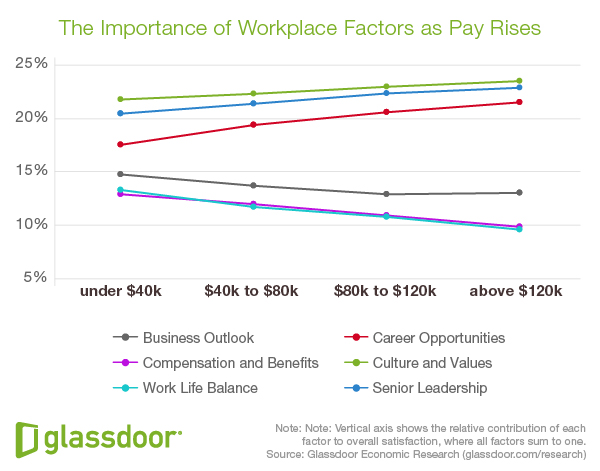Research shows that employees don’t value compensation as highly as things like culture and values. But what does that mean exactly?
Are we having the right conversations about compensation and meaningful work?
Fifty-six per cent of workers think that having purpose at work is more important than their salaries, according to new research commissioned by workplace meaning and happiness consultancy Rise. The research also found that 50 per cent would prefer a meaningful relationship with colleagues over a pay rise.
These findings gel with several other studies, both locally and internationally. Last year a Gartner report showed that, at the time, work-life balance was more important than compensation to Australian job seekers. And a study of US workers by Glassdoor (an employer review site) found that culture and values was the top workplace factor for employees, while compensation and benefits was ranked sixth of six.
But there’s something counterintuitive about all this research. Because earning the money we need to live is presumably the main reason we work at all.
Perhaps what we’re seeing is that while the research is accurate, by using ranking terminology the studies give the false impression of conflicting objectives. People might value culture more than money, but does that mean someone who lives and breathes culture will take a job at a perfect workplace, even if the pay is awful?
A sliding scale
In the Glassdoor research, they tracked how different rates of pay corresponded to what employees value at work. While the rankings remain more or less the same, the emphasis changes as workers receive higher compensation.
The purple line representing compensation and benefits tracks down as employees are paid more. Which makes sense, financial security becomes less important once you already have it. But what’s most fascinating for the argument about compensation versus happiness is that while pay dips in importance as people are paid more, the graph shows the opposite happens with career opportunities (in red).
Career opportunities is a broad enough term that it encompasses not only promotions (which are usually tied to salary increases) but also different kinds of work, more responsibility, and so on. So while it’s true that it doesn’t have a one-to-one correlation with pay, in most cases the end result of receiving more career opportunities is higher pay.
It might be the most cynical way of putting it, but it’s as if higher paid employees are saying, “don’t pay me more, give me the chance to flourish (and then be paid more)”.
Candidate or employee?
The pay equation goes the other way too. The Rise research found that 66 per cent of Australians say they value happiness at work more than money, but 69 per cent say that paying their monthly living expenses is a major reason why they stay in their jobs.
This is an important point. There is a difference between retention and engagement, even if they’re deeply intertwined. The research suggests money is more important to the former, while culture and meaning perhaps have more impact on the latter.
What employees want and what potential recruits expect also varies. “Compensation and benefits may have less predictive power for employee satisfaction than the other factors, but it is still the top factor that job seekers consider when evaluating potential employers,” writes chief economist at Glassdoor, Dr. Andrew Chamberlain, about their study.
So if you think of a job as the contract you sign, the reason why pay is not ranked more highly by most employees seems simple. It was important before they took the job but now that they’ve agreed to the pay, it’s more of a settled issue. What isn’t settled are the numerous other factors at your workplace – how you get along with your colleagues, what you think of leadership, etc.
Invest in those who invest in you
It’s worth mentioning that higher pay likely correlates with higher investment in your organisation. If you’re earning a good wage you’ll want your job to last, and you want it to be meaningful. In the Glassdoor chart, it was the highest paid employees who cared the most about senior leadership and culture and values. They’re also the employees most likely to be close to, or even in, senior leadership.
Chamberlain backs up this point: “Our research suggests that further tinkering with the compensation package is not likely to improve employee satisfaction much, particularly among higher-earning employees.”
So yes, of course wellbeing, culture, and meaningful work are all very important considerations. There’s even a strong case that they’re much more valuable than money to your employees. But if you read research about how a good salary can’t buy employee happiness, don’t take it too literally.
Photo credit: Sheila Sund
Explore creative ways to source and attract talent, select staff and retain high performing employees, in the AHRI short course ‘Attracting and retaining talent’.



Makes sense to me, I took a role in NFP with real meaning for much less of a salary but at that time of my life it suited me for a whole range of reasons. Not sure if I would do that again however.
I think it all depends on where the individual sits on the hierarchy of needs because this changes over time.I have recruited individuals who opted to leave their high paying jobs for better flexibility and career advancement. Sometimes, the pay may not be as significant as is perceived in the research but every situation is different.